
 i_need_contribute
i_need_contribute

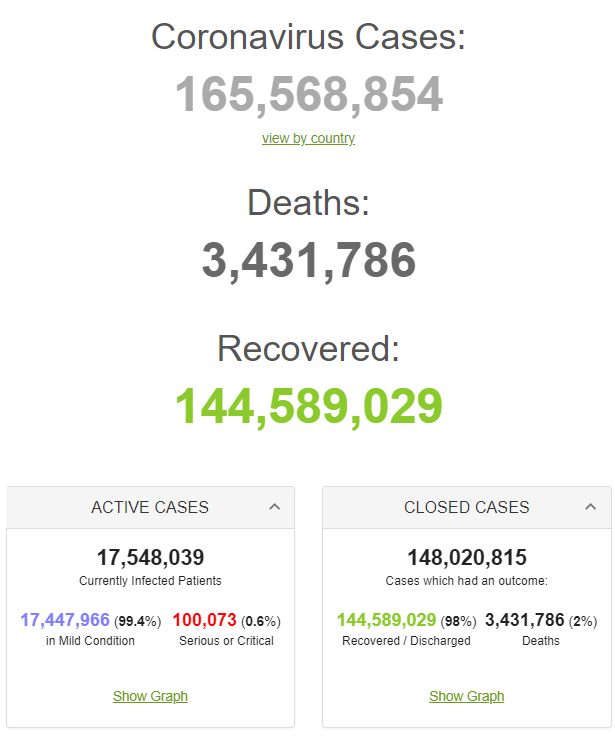
| Country, | Total | New | Total |
| Other | Cases | Cases | Deaths |
| World | 165,547,544 | 660,341 | 3,431,403 |
| USA | 33,802,324 | 28,541 | 601,949 |
| India | 25,771,405 | 276,261 | 287,156 |
| Brazil | 15,815,191 | 79,706 | 441,864 |
| France | 5,917,397 | 19,050 | 108,181 |
| Turkey | 5,151,038 | 11,553 | 45,419 |
| Russia | 4,965,676 | 7,920 | 116,965 |
| UK | 4,452,527 | 2,696 | 127,694 |
| Italy | 4,172,525 | 5,506 | 124,646 |
| Germany | 3,627,777 | 11,881 | 87,405 |
| Spain | 3,625,928 | 6,080 | 79,568 |
| Argentina | 3,411,160 | 39,652 | 72,265 |
| Colombia | 3,161,126 | 16,579 | 82,743 |
| Poland | 2,859,261 | 2,344 | 72,250 |
| Iran | 2,792,204 | 12,789 | 77,765 |
| Mexico | 2,385,512 | 2,767 | 220,746 |
| Ukraine | 2,165,233 | 5,138 | 48,696 |
| Peru | 1,903,615 | 5,715 | 67,034 |
| Indonesia | 1,753,101 | 4,871 | 48,669 |
| Czechia | 1,655,414 | 1,191 | 29,948 |
| South Africa | 1,621,362 | 3,522 | 55,507 |
| Netherlands | 1,610,868 | 4,549 | 17,488 |
| Canada | 1,342,388 | 4,247 | 25,066 |
| Chile | 1,300,629 | 4,767 | 27,997 |
| Philippines | 1,159,071 | 4,700 | 19,507 |
| Iraq | 1,151,557 | 4,609 | 16,069 |
| Romania | 1,073,679 | 707 | 29,716 |
| Sweden | 1,051,762 | 14,349 | |
| Belgium | 1,034,714 | 1819 | 24,749 |
| Pakistan | 886,184 | 3,256 | 19,856 |
| Portugal | 843,278 | 511 | 17,013 |
| Israel | 839,221 | 54 | 6,395 |
| Hungary | 799,588 | 633 | 29,329 |
| Bangladesh | 783,737 | 1,608 | 12,248 |
| Jordan | 727,612 | 1,180 | 9,314 |
| Serbia | 708,328 | 609 | 6,725 |
| Japan | 692,702 | 5,229 | 11,851 |
| Switzerland | 684,954 | 1,554 | 10,755 |
| Austria | 639,054 | 899 | 10,508 |
| UAE | 550,029 | 1,348 | 1,639 |
| Lebanon | 537,043 | 489 | 7,651 |
| Morocco | 515,758 | 338 | 9,106 |
| Malaysia | 485,496 | 6075 | 2,040 |
| Nepal | 480,418 | 8,064 | 5,657 |
| Saudi Arabia | 436,239 | 1,213 | 7,201 |
| Bulgaria | 415,687 | 361 | 17,416 |
| Ecuador | 412,907 | 1,441 | 19,979 |
| Slovakia | 388,138 | 246 | 12,262 |
| Greece | 383,558 | 2,292 | 11,587 |
| Belarus | 380,089 | 1,378 | 2,732 |
| Panama | 372,221 | 537 | 6,305 |
| Kazakhstan | 364,048 | 2,018 | 4,124 |
| Croatia | 351,997 | 1,000 | 7,792 |
| Bolivia | 337,441 | 2,617 | 13,635 |
| Georgia | 333,601 | 1,160 | 4,519 |
| Azerbaijan | 331,040 | 339 | 4,814 |
| Tunisia | 329,925 | 1,397 | 12,032 |
| Paraguay | 321,032 | 2,781 | 7,914 |
| Palestine | 304,532 | 458 | 3,448 |
| Kuwait | 294,693 | 1,119 | 1,703 |
| Costa Rica | 293,820 | 2,900 | 3,696 |
| Dominican Republic | 279,565 | 1,016 | 3,597 |
| Denmark | 269,343 | 1088 | 2,505 |
| Lithuania | 267,769 | 911 | 4,136 |
| Ethiopia | 267,597 | 497 | 4,038 |
| Ireland | 256,893 | 503 | 4,941 |
| Moldova | 254,213 | 138 | 6,053 |
| Slovenia | 250,453 | 532 | 4,338 |
| Uruguay | 249,365 | 3339 | 3,638 |
| Egypt | 249,238 | 1,160 | 14,498 |
| Guatemala | 243,833 | 1,049 | 7,928 |
| Honduras | 228,287 | 771 | 6,019 |
| Armenia | 221,368 | 229 | 4357 |
| Venezuela | 218,814 | 1,211 | 2,446 |
| Qatar | 214,150 | 295 | 538 |
| Oman | 207,805 | 696 | 2,228 |
| Bahrain | 206,878 | 2354 | 773 |
| Bosnia and Herzegovina | 202,847 | 172 | 9,086 |
| Libya | 182,350 | 338 | 3097 |
| Kenya | 166,382 | 376 | 3,035 |
| Nigeria | 165,852 | 43 | 2,067 |
| North Macedonia | 154,891 | 87 | 5,249 |
| Sri Lanka | 151,343 | 3,623 | 1,051 |
| Myanmar | 143,159 | 28 | 3,216 |
| S. Korea | 133,471 | 653 | 1,912 |
| Albania | 132,095 | 24 | 2,438 |
| Latvia | 129,297 | 609 | 2,298 |
| Cuba | 128,094 | 1339 | 834 |
| Estonia | 127,757 | 257 | 1232 |
| Algeria | 125,896 | 203 | 3395 |
| Norway | 120,292 | 478 | 781 |
| Thailand | 116,949 | 3394 | 678 |
| Kyrgyzstan | 101,219 | 253 | 1,725 |
| Montenegro | 99,031 | 60 | 1,566 |
| Uzbekistan | 97,280 | 212 | 674 |
| Ghana | 93,456 | 66 | 783 |
| Zambia | 92,630 | 110 | 1263 |
| China | 90,908 | 14 | 4636 |
| Finland | 90,687 | 289 | 929 |
| Cameroon | 77,429 | 1,189 | |
| Cyprus | 71,533 | 135 | 348 |
| Suriname | 12,409 | 158 | 239 |
| Vietnam | 4,690 | 178 | 37 |
Retrieved from: https://www.worldometers.info/coronavirus/
by GREGORY GONDWE
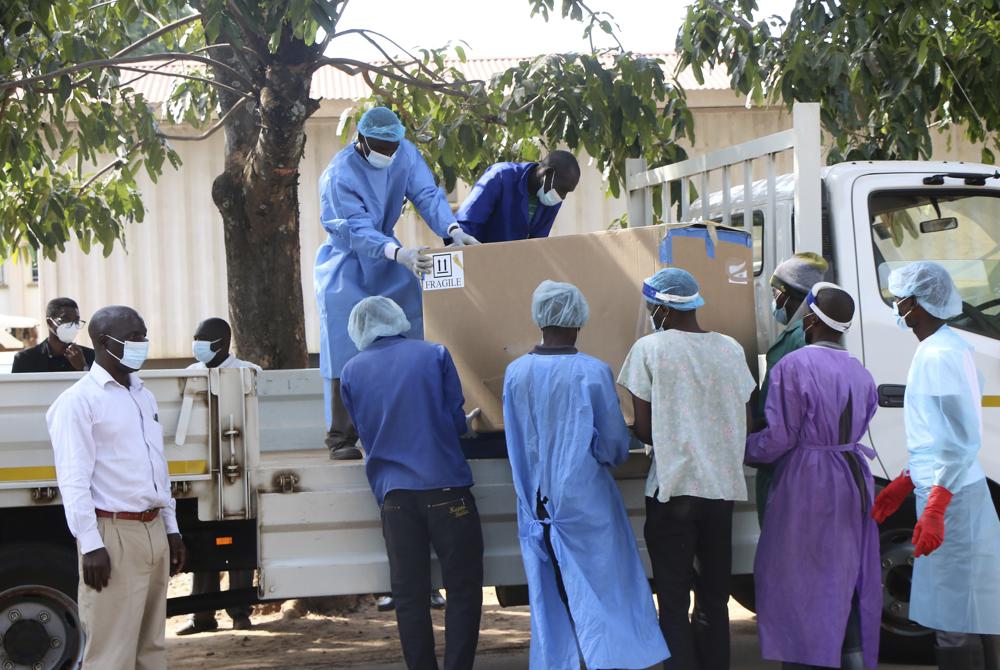
Blantyre, Malawi (AP) — Malawi has burned nearly 20,000 expired AstraZeneca vaccines, amid conflicting advice over what to do with the doses.
Health Minister Khumbize Kandodo Chiponda put some of the vials of the expired doses into an incinerator to start the destruction Wednesday at Kamuzu Central Hospital in Lilongwe, the capital.
“We are destroying (these vaccines) because as government policy no expired health commodities are to be used,” she said. “Historically under the expanded immunization program of Malawi no expired vaccine has ever been used.”
She said burning the vaccines will build public confidence that all vaccines used in Malawi are good.
“We are destroying publicly in order to stay accountable to Malawians. The vaccines that expired are not being used during the vaccination campaign," she said. "On behalf of the government, I assure all Malawians that no one will be given an expired COVID vaccine.”
The burned vaccines were the remainder of 102,000 doses that arrived in Malawi on March 26 with just 18 days until they expired on April 13. All other doses of the shipment, donated by the African Union, were successfully administered, she said.
The health minister thanked WHO, the African Union and India for donating the vaccines.
“This has made it possible for Malawi to embark on the COVID vaccination campaign currently underway,” she said.
Last month the World Health Organization urged African nations not to destroy expired doses of the AstraZeneca vaccine after several countries received doses from India with a very short shelf life. But this week, WHO reversed its position and said that the vaccines should be destroyed.
“Any vaccine that has passed its expiry date ... should not be administered,” said WHO in a statement dated May 17. “While discarding vaccines is deeply regrettable in the context of any immunization program, WHO recommends that these expired doses should be removed from the distribution chain and safely disposed.”
WHO said that in March, the African Union’s African Vaccine Acquisition Task Team redistributed 925,000 doses of the AstraZeneca vaccine produced by the Serum Institute of India with an expiry date of April 13 to 13 African countries. “The bulk of these vaccine doses were administered, but some countries have unused doses remaining,” said the WHO statement.
Malawi, a small southern African country of about 20 million people, had already decided to destroy its expired vaccine doses, ministry of health spokesman Joshua Malango told The Associated Press.
“We had stopped observation of proper storage mechanisms and the vaccines would have still been damaged in one way or the other,” he said.
The destruction of the vaccines was witnessed by several top officials "in order to enhance transparency,” health secretary Charles Mwansambo said.
Malawi will still have adequate stocks of COVID-19 vaccines in both public and private health facilities, he said. The government has not said where it will get more vaccines.
Malawi's got its first consignment of 360,000 AstraZeneca doses in early March from the U.N.-backed COVAX initiative which is providing vaccines to low- and middle-income countries. The country received another batch of 50,000 AstraZeneca doses from the Indian government. With the AU donation, Malawi had a total of 512,000 AstraZeneca doses.
So far 212,615 doses have been given in Malawi. The country has 34,216 confirmed cases, including 1,153 deaths, according to the Africa CDC.
Currently, the country is seeing a decrease in the disease, with the 7-day rolling average of daily new cases in Malawi dropping from 0.07 new cases per 100,000 people on May 4 to 0.04 new cases per 100,000 people on May 18. Official deaths from COVID-19 are also declining, according to statistics from Johns Hopkins University.
Malawi, like many other African countries, has relied on the AstraZeneca vaccine that has been distributed by COVAX and the African Union. But now supplies of the vaccine have become more scarce because India, the main supplier of vaccines to COVAX, has stopped exports until it has adequately vaccinated large numbers of its population of 1.4 billion people.
The Serum Institute of India says it hopes to start delivering coronavirus vaccines to COVAX and to other countries by the end of the year. The delay will significantly set back global efforts to immunize people against COVID-19. India’s Serum Institute is the world’s biggest vaccine-maker. The company said in March that it was postponing all exports of coronavirus vaccines to deal with the explosive surge of cases on the subcontinent. At the time, the World Health Organization said it expected COVID-19 vaccine deliveries from India to resume by June and the interruption would affect about 90 million doses.
Retrieved from: https://apnews.com/article/united-nations-africa-malawi-business-coronavirus-pandemic-62db290b981cb611f511b4027275600e
China is always the firm supporter for African countries in their fight against COVID-19, said Chinese State Councilor and Foreign Minister Wang Yi on Wednesday.
Wang made the remarks when he chaired the UN Security Council's high-level open debate on "Peace and security in Africa: Addressing root causes of conflict while promoting post-pandemic recovery in Africa."
China will never step away from anything as long as it's good for Africa, said Wang in his speech.
The country is providing urgent COVID-19 vaccines to over 30 African countries, said Wang, who also called on all the countries with the capacity to provide urgent vaccines to aid Africa.
Wang noted the purpose for China to organize the open debate at the UNSC is to promote the international community to pay attention to the serious challenges posed by the epidemic to the peaceful development of Africa.
He urged international community to build consensus, to work together with African countries to overcome the pandemic while promoting post-pandemic recovery in Africa as well as eliminating the root causes of conflicts to inject new momentum for lasting peace and sustainable development in Africa.
The Chinese foreign minister made four proposals in his statement:
Gap reduction in COVID-19 response
Wang called on the international community to urgently offer more assistance to Africa in terms of medical supply, medicines, technology and funding in particular to make vaccines accessible and affordable.
In the long run, Wang said international community should help Africa enhance its capability in public health construction, strengthen prevention and control mechanisms and build a community of common health for mankind.
He added the United Nations should play a leading and coordinating role.
Help Africa tackle 'peace deficit'
The Chinese foreign minister said the UN and the African Union (AU) should coordinate with each other closely to allow the UN's "Global Ceasefire" initiative to go hand-in-hand with the AU's "Silencing the Guns" Initiative.
He called for continued support for African countries to seek African solutions for African problems and to promote political settlements and peaceful reconciliation processes.
"We should actively provide peacekeeping funding to Africa, support AU peace operations, and help Africa build up its own peacekeeping, stability maintenance and counter-terrorism capacity."
Wang emphasized the important role of economic growth and social construction in promoting peace and work to eliminate the root causes of unrest.
"We should resolutely oppose unreasonable interference by external forces in African countries to avoid creating more contradictions and conflicts," he stressed.
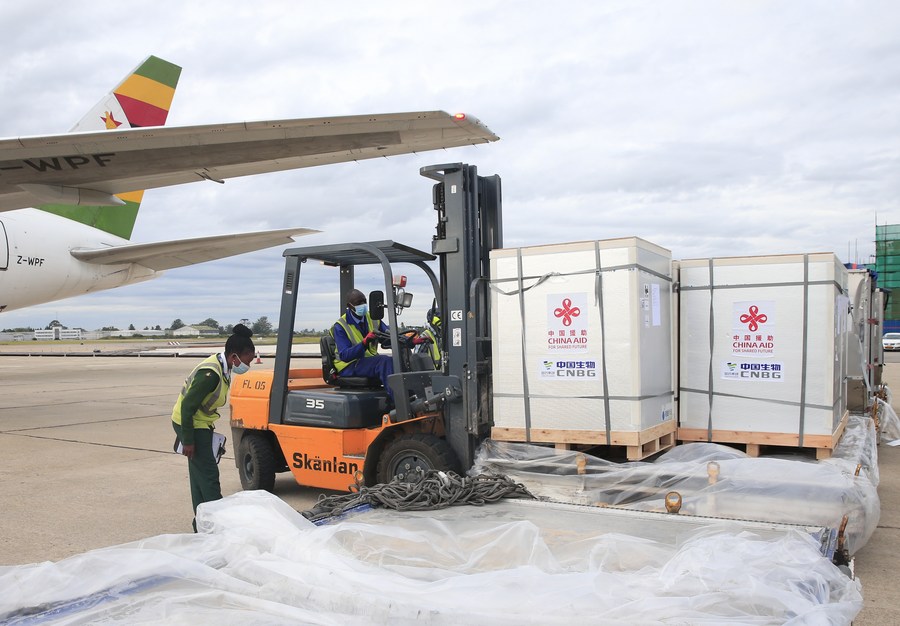
Offloading Chinese-donated COVID-19 vaccines at Robert Gabriel Mugabe International Airport in Harare, Zimbabwe, February 15, 2021. /Xinhua
Help Africa narrow the development gap
Saying Africa is a continent with great potential and promising prospects, Wang stressed the key is to support Africa in exploring a development path suitable to their national conditions.
Developed countries should take concrete measures including debt relief, development assistance, and technology transfer to fulfill their international responsibilities, he said.
For developing countries, Wang said these partners should support Africa in accelerating the industrialization and modernization process and help Africa enhance its independent development and innovation capacity.
Help Africa readdress in global governance
In his address, Wang stressed that without the support and participation of African countries, the United Nations cannot do things well.
"To achieve equal rights, equal opportunities and equal rules for all countries, we cannot do without increasing the representation and voice of African countries in international affairs, which is the true meaning of multilateralism," he added.
In the face of the once-in-a-century pandemic, China and Africa are willing to launch a partnership initiative to support Africa's development, Wang said.
He called on the international community to beef up support for Africa in fighting the pandemic, post-pandemic reconstruction, trade and investment, debt relief, food security, poverty reduction and alleviation, coping with climate change, as well as industrialization.
"China welcomes more countries and international organizations, especially Africa's traditional cooperation partners, to join this initiative, adhering to the principle of 'Africa-led, equal-footing, and openness,' strengthening coordination and cooperation, committing to real multilateralism, so as to gather the strong force to support Africa's development," he said.
A presidential statement drafted by China, which holds the presidency of the Security Council in May, was adopted at the meeting. In the statement, the Security Council makes clear its grave concern over disruptive impacts the COVID-19 pandemic has exerted on Africa's economy, politics, security and humanitarian record and over its worsening conflicts.
Efforts should be made to address contentious issues through dialogues, negotiations and consultations and convince all parties to end hostilities immediately to meet the goal of "Silencing the Guns in Africa," reads the statement. It also stressed the importance of social and economic development for the continent's lasting peace.
(With input from Xinhua)
Retrieved from: https://news.cgtn.com/news/2021-05-19/Wang-Yi-China-firmly-supports-Africa-in-fight-against-COVID-19--10oIUMUVfhK/index.html
From CNN’s Esha Mitra in New Delhi
Several Indian states are facing shortages of a drug used to treat black fungus, a rare and potentially fatal infection that is increasingly being detected in Covid-19 patients, health authorities in the country have warned.
The infection, known by doctors as mucormycosis, had been seen in India before the pandemic, but cases are mounting rapidly in coronavirus patients and those who have recently recovered. It is caused by mold found in wet environments and can attack the respiratory tract, particularly of those with compromised immune systems.
At least 90 people have died of black fungus in the western state of Maharashtra, which includes the bustling financial center Mumbai and has been hit hard by the pandemic, said the state's health minister Rajesh Tope on Wednesday. At least 800 people are currently hospitalized with the infection.
Some 2,000 cases have so far been recorded, according to local health officials.
"We are now getting 100 cases daily on average," Dr. Tatyarao Lahane, a senior state health official, told CNN on Wednesday.
The state of Rajasthan, which has also reported cases of black fungus, has declared it an epidemic and a "notifiable disease." Two other states, Haryana and Telangana, have also declared it a notifiable disease, to be reported to the central Indian government.
Some 115 cases were found in Haryana and at least 150 in Telangana, according to state officials.
Black fungus cases have also been found in New Delhi, according to Padma Srivastava, head of the department of neurology at the All India Institute Of Medical Sciences in the capital.
"Every single day in emergency it is average 20 and above (cases reported)," Srivastava told local media on Wednesday, adding that a separate ward had been created for black fungus patients at the hospital.
Destruction of Gaza's Covid-19 lab poses high risk of virus spreading, say Palestinian health officials
From CNN's Richard Greene in Jerusalem and Hande Atay Alam in Izmir, Turkey
A medical worker works at the Rimal Clinic in Gaza on April 28. Rizek Abdeljawad/Xinhua/Getty Images
Gaza's main Covid-19 laboratory, the Rimal clinic, is unable to carry out coronavirus testing after being destroyed by Israeli airstrikes, the Hamas-run Palestinian Ministry of Health said, warning the situation “certainly poses a high risk of the spread of the virus.”
The ministry issued the warning in a statement about the effect of Israeli airstrikes on medical facilities in Gaza.
"A number of health facilities (21), including the MOH administrative complex and Rimal clinic, have been targeted or affected by the airstrikes. Thus, COVID-19 laboratory testing services, that are solely provided at the MOH Central Laboratory in Rimal clinic, have been completely ceased, which certainly poses high risks of widespread of the virus," the ministry said Wednesday.The Rimal clinic was damaged by Israeli airstrikes on Monday, Hamas authorities said. Video from the scene showed windows blown out in the building. At the time, Hamas referred to the clinic as one of Gaza’s main coronavirus testing centers.
A spokesperson for the Israel Defense Forces told CNN on Tuesday that it targeted the main operations center of the Hamas internal security forces in the Rimal neighborhood, and that the target building was close to the clinic.
The Ministry of Health statement called UN agencies and humanitarian organizations "to protect health teams and establishments, as well as to advance pressure on the Israeli side to allow entry of critically needed medical supplies into the Gaza Strip ASAP."
Israel – which controls two entry points into Gaza – briefly opened the crossings on Tuesday, but said it closed them in response to mortar fire from the territory towards Israel.
On Wednesday, mortars were again fired from Gaza as a shipment of aid from Jordan, including medical supplies, was passing through the Kerem Shalom crossing, prompting Israel again to close the crossing, Israeli authorities said. The shipment did not get through.
From CNN's Rodrigo Pedroso in Sao Paulo
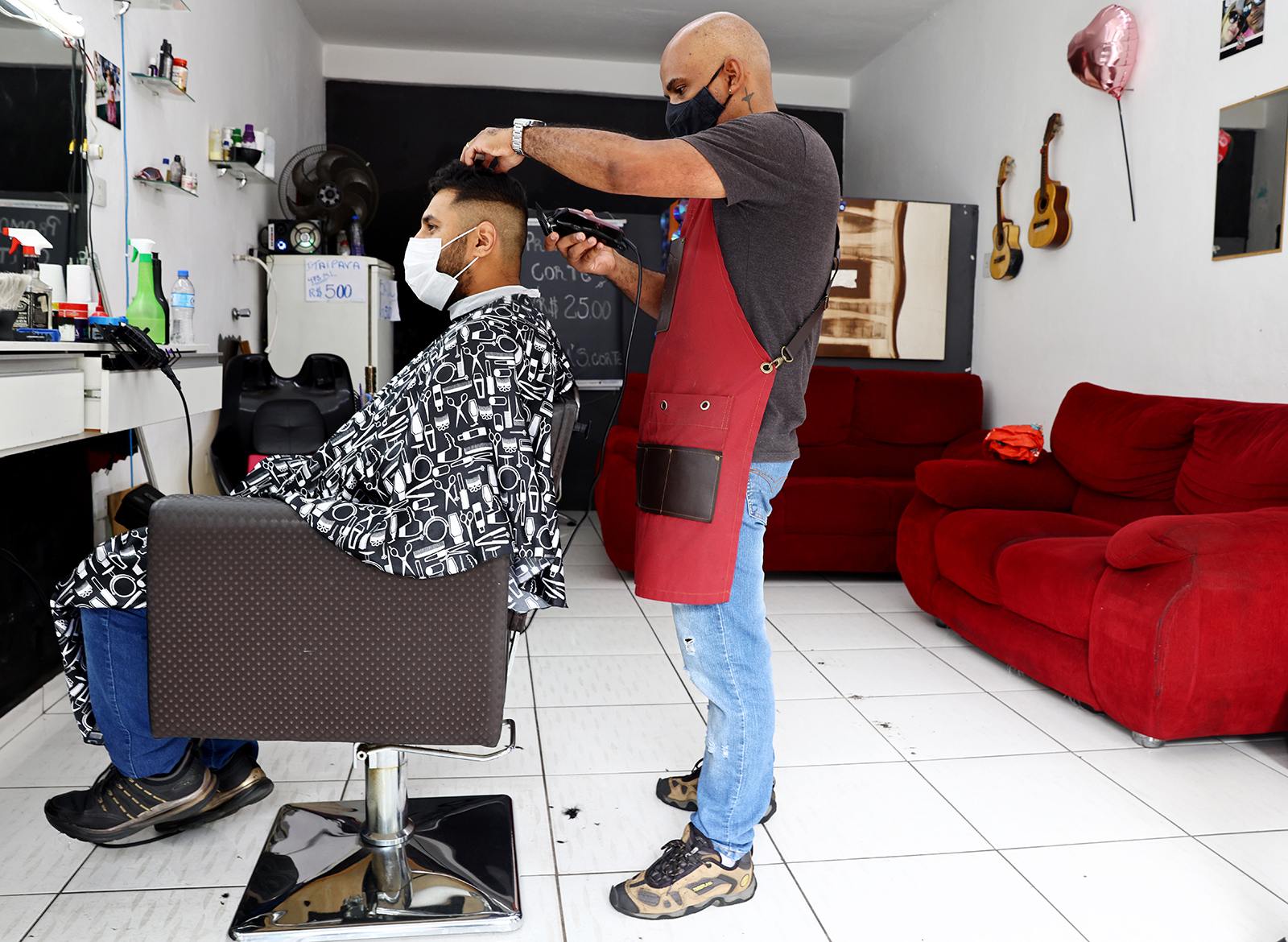
A barber cuts the hair of a client in his barbershop in the Brasilandia neighborhood amid the pandemic on May 15, in Sao Paulo, Brazil. Mario Tama/Getty Images
The government of Sao Paulo announced Wednesday it will start easing Covid-19 restrictions from June 1 despite rising new cases and hospitalization rates.
Authorities in the southeastern Brazilian state said opening hours for commercial establishments will now be extended until 10 p.m. The recommended maximum capacity for all commercial spaces, including bars, restaurants, and gyms, will also be increased from 40% to 60%.
The announcement comes after the number of Covid-19 patients admitted to intensive care units in Sao Paulo rose again this week, reaching the mark of 10,000 patients in ICU beds in the state health system. The ICU bed occupancy across the state is at 80%.
After eight consecutive days in which around 9,000 patients were hospitalized, the state health secretary on Tuesday registered an increase of hospitalization to 10,159 patients in Sao Paulo's hospitals. The current hospitalization number is much higher than the peak of the first wave of the epidemic in July last year, which put 6,250 people in ICU units in the state.
The daily average of new Covid-19 cases in Sao Paulo increased 8.1% in the first three days of this week, compared to the same period last week. The number of daily deaths also increased by 9.8%.
According to the state health secretary, Sao Paulo has reported 3,129,412 total cases and 105,852 deaths from coronavirus.
Retrieved from: https://edition.cnn.com/world/live-news/coronavirus-pandemic-vaccine-updates-05-20-21/index.html
David Shepardson
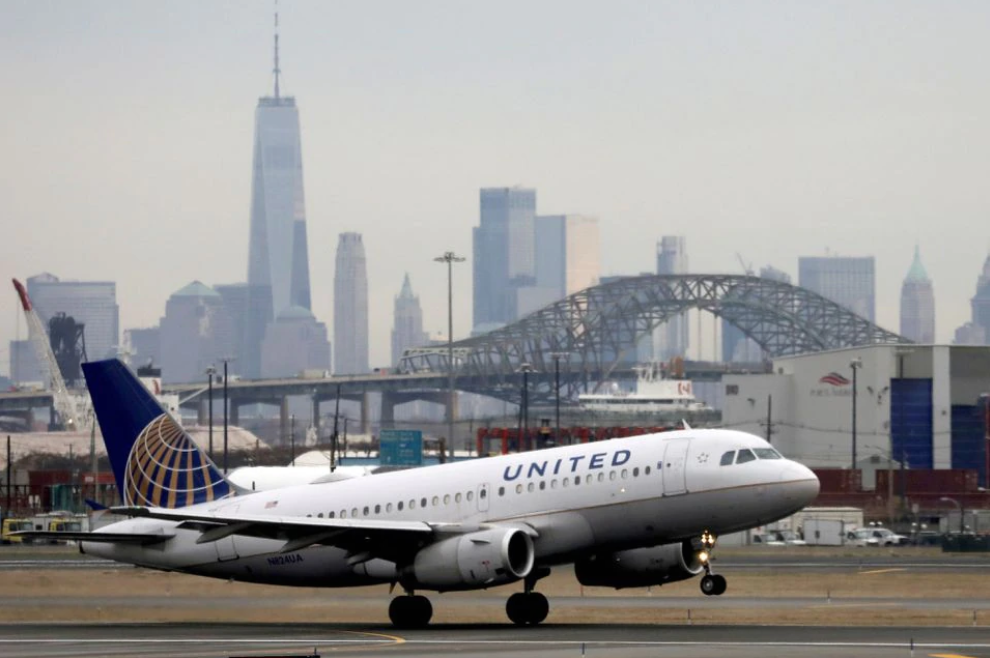
A United Airlines passenger jet takes off with New York City as a backdrop, at Newark Liberty International Airport, New Jersey, U.S. December 6, 2019. REUTERS/Chris Helgren/File Photo
The Biden administration has been weighing changes to sweeping travel restrictions that bar much of the world’s population from coming to the United States, but has reached no decisions, government and industry officials told Reuters.
European Union countries agreed on Wednesday to ease COVID-19 travel restrictions on non-EU visitors ahead of the summer tourist season, a move that could open the bloc’s door to all Britons and to vaccinated Americans.
Ambassadors from the 27 EU countries approved a European Commission proposal from May 3 to loosen the criteria to determine “safe” countries and to let in fully vaccinated tourists from elsewhere, EU sources said.
Biden administration agencies have been holding meetings for more than a month and reaching out to industry officials about when and how they could begin to unwind the travel restrictions first imposed in early 2020 in response to COVID-19 that bar much of the world's population from entering the United States.
Asked whether the United States would allow vaccinated Europeans to enter, a White House spokesman said there were no changes in travel restrictions planned at the moment.
The U.S. Travel Association said it hoped the "European Union’s risk-based, science-driven plan to reopen international travel will hopefully spur the U.S. to heed the many calls for a plan and timetable to safely reopen our borders."
U.S. Transportation Secretary Pete Buttigieg told a news conference on Wednesday that any decision to lift restrictions "ultimately is a public health decision and there is an interagency process and obviously the CDC (U.S. Centers for Disease Control and Prevention)" is taking a leading role.
Buttigieg added: "There are two ways of looking at this - one is to look at countries, the other is to look at travelers," in terms of trying to maximize safety and allow for more travel.
A coalition of U.S. and European travel, airline, union, business and airport groups has called for a full reopening of the U.S.-UK air travel market “as soon as safely possible" - and hopes both government will lift restrictions by early June.
Nearly all of Europe still bans most U.S. travelers from visiting, while Britain allows American visitors but requires a 10-day quarantine on arrival and two COVID-19 tests.
Since early 2020, the United States has barred nearly all non-U.S. citizens who have recently been in the UK and much of Europe, as well as China, Iran and Brazil. This year, Washington added South Africa and India to the list.
Retrieved from: https://www.reuters.com/world/us/us-weighs-changes-covid-19-travel-restrictions-2021-05-20/
Singapore on Thursday ordered Facebook (FB.O) and Twitter (TWTR.N) to carry a correction notice to users of the social media platforms in the country over what it says is a false statement about a new virus variant originating in Singapore.
The ministry of health said it was aware of the statement circulating online on media outlets and social media platforms, which implied that a new, previously unknown variant of COVID-19 originated in Singapore and risked spreading to India from the city-state.
The move came after Delhi Chief Minister Arvind Kejriwal said in a Twitter post this week that a new form of the virus that was particularly harmful to children had come to Singapore, and urged for a ban on flights.
Both the Singapore and Indian governments have criticised the opposition politician, saying his comments were not based on facts and were “irresponsible”.
The correction orders were issued under Singapore's fake news law, or the Protection from Online Falsehoods and Manipulation Act.
Facebook confirmed receipt of the order and said it was legally compelled to issue the correction notice.
A prompt on users' Facebook news feeds linked to a government website that said there was no new 'Singapore' variant of COVID-19. Neither is there evidence of any COVID-19 variant that is 'extremely dangerous for kids', the health ministry said.
It said the B16172 strain found in many new COVID-19 cases in Singapore was first detected in India.
Twitter did not immediately respond to a request for comment.
Singapore Press Holdings’ (SPRM.SI) SPH Magazines, which was also issued the order, said it had complied and posted the notice in its HardWareZone forum.
Retrieved from: https://www.reuters.com/world/asia-pacific/singapore-tells-facebook-twitter-carry-correction-notice-virus-strain-2021-05-20/